Adam S. Miller is a professor of philosophy, prolific writer, and father of three. Throughout his career and authorship of several books, including Letters to a Young Mormon and An Early Resurrection: Life in Christ before You Die, Miller has interwoven philosophy with faith. We recently had the chance to ask him for some insights.
As a child, what did you want to be when you grew up?
I wanted to be a professional basketball player. But I had a mediocre jump shot, middling ball handling skills, and couldn’t jump very high. So that didn’t really go anywhere. I also wanted to be a writer and—maybe especially because words don’t care about your vertical leap—that dream has kind of come true, though in a different way than I imagined.
What’s the most unusual job you have ever had?
The most unusual job I’ve ever had is my current one: philosophy professor. Philosophy is itself a pretty unusual thing and, as a professor, my job description basically boils down to being paid to read books, talk about books with my classes, and write about books. That is a pretty weird job.
► You'll also like:LDS Comedian Jenna Kim Jones Talks Faith, Family, and Fun in Stand-Up Comedy
What are some of your hobbies?
Since I already used reading as my job description, I’d better not list that as a hobby. What do I do besides read? I run most mornings. I enjoy watching basketball—though I gave up playing years ago to protect my aging body. And I love television. My favorite shows in the past couple of years are Noah Hawley’s Fargo and Legion. Hawley is a genius. Both shows represent a rare kind of prestige TV: one that acknowledges the troubles and complexities of life, but where good, decent, ordinary people win out over evil in the end.
What is your favorite hymn?
I don’t have a clear front-runner. Let’s say “Come, Come Ye Saints” or Martin Luther’s “A Mighty Fortress Is Our God.” In general, I prefer the old Protestant hymns in our hymnbook.
What do you want to be most remembered for?
I want to be remembered for the fact that, no matter how old they got, I read to my kids at night for as long as they lived with me.
What sparked the idea for your book, Letters to a Young Mormon?
In part, I was looking for a way to distill some of my academic work for a popular audience, and I read a book written by a colleague, James K. A. Smith, called Letters to a Young Calvinist. (This book is actually just one example of a whole genre of books that are all titled Letters to a Young X. You can probably find 30 examples on Amazon.) The deeply personal and flexible form of the book struck me as just the right kind of vehicle for what I wanted to do.
More important, though, once I got started and found myself writing the letters with my own children in mind, I found that I had a really powerful motivation to be as honest and clear and personal as I could manage. If the book has a strength, I think it’s this tone that grew out of my attempt to record for my kids some of the really important things that, in the course of everyday life, are hard to say. I wanted them to know what I think it means to be [a Latter-day Saint] and why, regardless of life’s challenges, I’ve made the Church my home.
► You'll also like:Hank Smith Shares the Biggest Thing He's Learned from the Youth of the Church + More
Which of the letters in Letters to a Young Mormon do you think is the most important?
The letter on sin is probably the most important to the book. The book pivots on my description of sin as a problem that runs deeper than my individual mistakes. More than these individual mistakes, sin has to do with the way that I’m constantly rejecting the life God is giving me because it doesn’t match up neatly with the imagined story I had wanted my life to tell.
Which letter did you most enjoy writing?
The letter I most enjoyed writing was the new letter (added for the second edition) that talks about Sabbath worship as a way of ushering a bit of eternity into the ordinary flow of time. Also, this letter includes my mother’s recipe for bread!
How has your study of philosophy strengthened your faith?
Philosophy is less about answers than it is about questions. As a result, philosophy has taught me how to love difficult questions for their own sake, to be patient with how fragile words and ideas are, and to appreciate the solidity of answers that go deeper than words.
What sparked the idea for your newest book, An Early Resurrection?
In An Early Resurrection: Life in Christ before You Die, I reflect on how life in Christ changes our experience of time. The Book of Mormon, for example, argues that we ought to “look forward unto theMessiah, and believe in him to come as though He already was” (Jarom 1:11). Regardless of whether we’re waiting for Christ’s first coming or His second, what does this look like? What does it look like to live as though Christ were already here? What does it look like to live our future redemption in the present tense? Or, to borrow an image from Paul, what would it look like if I were to die and be resurrected in Christ before leaving my mortal body? An Early Resurrection is a practical meditation on this kind of Christ-centered life.
What's your favorite part of being a husband and father?
My favorite part of being a husband and father is bedtime. We’ve made it through the day, we’ve got a little time together on the other side of that finishing line, and, soon, the house is about to get very quiet.
► You'll also like Just Asking: Interview with Bestselling Author Brandon Mull
What advice do you have for teens or adults who feel confused or lost when trying to understand gospel principles?
I would recommend focusing on two very practical questions. In my view, the gospel is trying to describe a very particular kind of life, a very particular way of handling and redeeming suffering and loss. What, exactly, does this kind of life look like? And, if you try living that way, does it work? For my part, I know next to nothing about supernatural things, but I’m utterly convinced that the kind of redeemed life Christ describes in our scriptures is real, near, and possible.
What’s the best piece of advice you have ever received?
The best piece of advice I ever received came from the Bhagavad Gita (a beautiful little book of Hindu scripture). The advice is basically this: keep your focus on the action to be performed and forget about having any attachment to the fruit of that action. In short, treat every work as a grace, as a duty to be lovingly performed for its own sake, and let God sort out the rest.
Lead image from Adam S. Miller
Don't miss Adam S. Miller's new book, An Early Resurrection: Life in Christ Before You Die, available at Deseret Book stores and deseretbook.com.
In this thought-provoking exploration of the writings of the Apostle Paul and Book of Mormon prophets, Adam Miller examines what life in Christ looks like. How can we let ourselves and our own desires die so we can be born again to a new life, a full life in Christ, here and now in this mortal life? Embark with the author on this journey—at once scriptural, philosophical, and literary—and discover one way to share a life with Christ as if he were present today.



